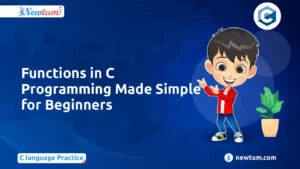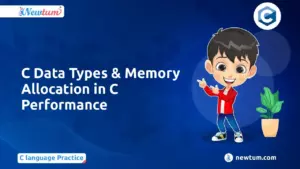Starting to learn programming can feel like venturing into a new world full of strange terms and concepts. One of these essential concepts is ‘Understanding the C Compiler and Compilation Process’. Why’s it important, you ask? Well, it’s the backbone of running your C programs smoothly! The compilation process translates your human-friendly code into machine language, allowing computers to understand and execute your instructions. So, buckle up! We’re about to dive into how this magical transformation happens. Curious about turning your code into powerful computer actions? Let’s explore together!
What is a C Compiler?
A C compiler is a specialized software tool that translates C programming code into machine-readable code, which can then be executed by a computer. The primary role of a C compiler is to convert high-level source code written in C into lower-level machine code or an intermediate representation, such as assembly language, that the computer’s processor can understand.
Popular C compilers include:
- GCC (GNU Compiler Collection): Widely used and supports multiple languages, including C.
- Clang: Known for its fast compilation speed and better diagnostics.
- Turbo C: A legacy compiler that was popular in the 1990s, mainly for DOS-based systems.
- MinGW: A minimalist GCC for Windows that enables development in C and C++.
Choosing the right compiler is essential for optimizing the performance of the code and ensuring compatibility with the target platform. Factors such as speed, error reporting, debugging support, and platform compatibility should influence the selection.
Overview of the Compilation Process
The compilation process transforms high-level C code into machine code that can be executed by a computer. It involves four key steps:
- Linking: Combines object files and libraries to create the final executable. This process ensures that the program can run on a specific platform.
- Preprocessing: Handles directives like macros and includes.
- Compiling: Converts preprocessed code into assembly language.
- Assembling: Translates assembly code into object files (.obj or .o).
Our AI-powered c online compiler revolutionizes coding by enabling users to instantly write, run, and test their C code. With AI assistance, beginners can efficiently debug and optimize their programs, making the coding journey smooth and enjoyable.
Compilation Workflow with an Example
Simple C Program Example
Here’s a simple C program to illustrate the compilation process:
cCopy code#include <stdio.h>
int main() {
int num1 = 5, num2 = 10, sum;
sum = num1 + num2;
printf("The sum is: %d\n", sum);
return 0;
}
Compilation Process Walkthrough:
- Preprocessing
The preprocessor handles directives like#includeand replaces them with actual code. For example, the#include <stdio.h>directive is replaced with the content of thestdio.hheader file, which provides the necessary functions likeprintf. The output file is typically saved asprogram.i.Command:bashCopy codegcc -E program.c -o program.i - Compilation
The compiler converts the preprocessed code (program.i) into assembly language. This step translates human-readable code into assembly instructions specific to the machine architecture. The output file isprogram.s.Command:bashCopy codegcc -S program.i -o program.s - Assembly
The assembler translates the assembly language (program.s) into machine code, generating an object file (program.o). The object file contains the machine-level instructions that the processor understands.Command:bashCopy codegcc -c program.s -o program.o - Linking
The linker combines the object file (program.o) with any necessary libraries (such as the C standard library) to create the final executable (program.exeora.out).Command:bashCopy codegcc program.o -o program.exe
Intermediate Files:
program.i: Preprocessed code.program.s: Assembly code.program.o: Object file with machine code.program.exe(ora.outon Unix systems): Final executable file.
6. Common Errors During Compilation
1. Syntax Errors
These occur when the code doesn’t follow the correct syntax rules of C. Examples include missing semicolons, incorrect parentheses, or improper use of keywords.
Example Error:
cCopy codeint main() {
printf("Hello, World!") // Missing semicolon
}
Fix:
Ensure that all statements end with a semicolon.
cCopy codeint main() {
printf("Hello, World!"); // Corrected
}
2. Missing Header Files
This error happens when the required header files are not included or are incorrectly specified. For example, using printf without including the stdio.h header results in an error.
Example Error:
cCopy codeint main() {
printf("Hello, World!"); // Error: 'printf' not declared
}
Fix:
Include the necessary header file.
cCopy code#include <stdio.h>
int main() {
printf("Hello, World!");
}
3. Linking Errors
Linking errors occur when the linker cannot find the definition of a function or variable used in the program. This can happen when an external library or object file is not correctly linked.
Example Error:
bashCopy codeundefined reference to `sqrt`
Fix:
Ensure that the necessary libraries are linked. For example, linking the math library for functions like sqrt.
bashCopy codegcc program.c -lm -o program.exe # Use '-lm' to link the math library
Tips for Debugging and Fixing Errors:
- Check Syntax: Carefully review your code for missing punctuation or incorrect keywords.
- Verify Header Files: Ensure that all required headers are included at the top of your file.
- Use Compiler Warnings: Use the
-Wallflag to enable all warnings and get helpful hints on potential issues:bashCopy codegcc -Wall program.c -o program.exe - Use Debugging Tools: If errors are complex, use debugging tools like
gdbto trace and inspect the code during execution. - Check Linking Command: Make sure you include all necessary libraries during the linking stage using the correct flags.
By understanding and addressing these common errors, you can avoid compilation issues and ensure a smooth development process.
Tools and Commands for Compilation
Common GCC Commands
GCC (GNU Compiler Collection) is a widely used C compiler. Here are some common commands used during the compilation process:
- Preprocessing:bashCopy code
gcc -E file.c -o file.i # Generates the preprocessed output - Compiling:bashCopy code
gcc -S file.i -o file.s # Converts preprocessed code to assembly language - Assembly:bashCopy code
gcc -c file.s -o file.o # Converts assembly code into an object file - Linking:bashCopy code
gcc file.o -o output.exe # Links the object file to create the executable - Compiling and Linking in One Step:bashCopy code
gcc file.c -o output.exe # Preprocesses, compiles, and links in one command
IDEs for Streamlined Compilation
Several Integrated Development Environments (IDEs) simplify the compilation process by automating these steps. Popular IDEs for C programming include:
- Code::Blocks: An open-source IDE with easy-to-use features, great for C and C++ development.
- Dev-C++: A lightweight IDE for C/C++ that includes a built-in compiler.
- Eclipse: An IDE that supports various languages, including C, with powerful tools for compiling and debugging.
- CLion: A cross-platform IDE from JetBrains designed for C/C++ development, with advanced features like code completion and automated builds.
These IDEs handle most of the compilation process in the background, allowing developers to focus more on coding rather than managing the compilation steps manually.
Benefits of Understanding the Compilation Process
Understanding the compilation process is crucial for developers as it enables them to:
Identify Bottlenecks: Understanding the underlying process allows developers to pinpoint and resolve performance issues, leading to more efficient software.
Write Better Code: Knowing how the compiler processes code helps avoid common mistakes and write more efficient code.
Debug Effectively: Understanding compilation stages helps identify errors early in the process and debug them faster.
Optimize Performance: By analyzing the generated machine code, developers can optimize their programs for speed and memory usage.
Conclusion
The C compiler and its compilation process are essential to converting source code into executable programs. Gaining an understanding of this process helps developers write more efficient code, optimize performance, and debug effectively. Experimenting with each step of the compilation process is invaluable for hands-on learning. For further learning, explore online resources or documentation related to compilers and C programming.
In conclusion, gaining a solid grasp of the C Compiler and Compilation Process is crucial for any budding programmer. For further insights, Newtum offers excellent resources. Embrace this journey into coding, and don’t hesitate to explore more; your programming future awaits!
Edited and Compiled by
This blog was compiled and edited by Rasika Deshpande, who has over 4 years of experience in content creation. She’s passionate about helping beginners understand technical topics in a more interactive way.



